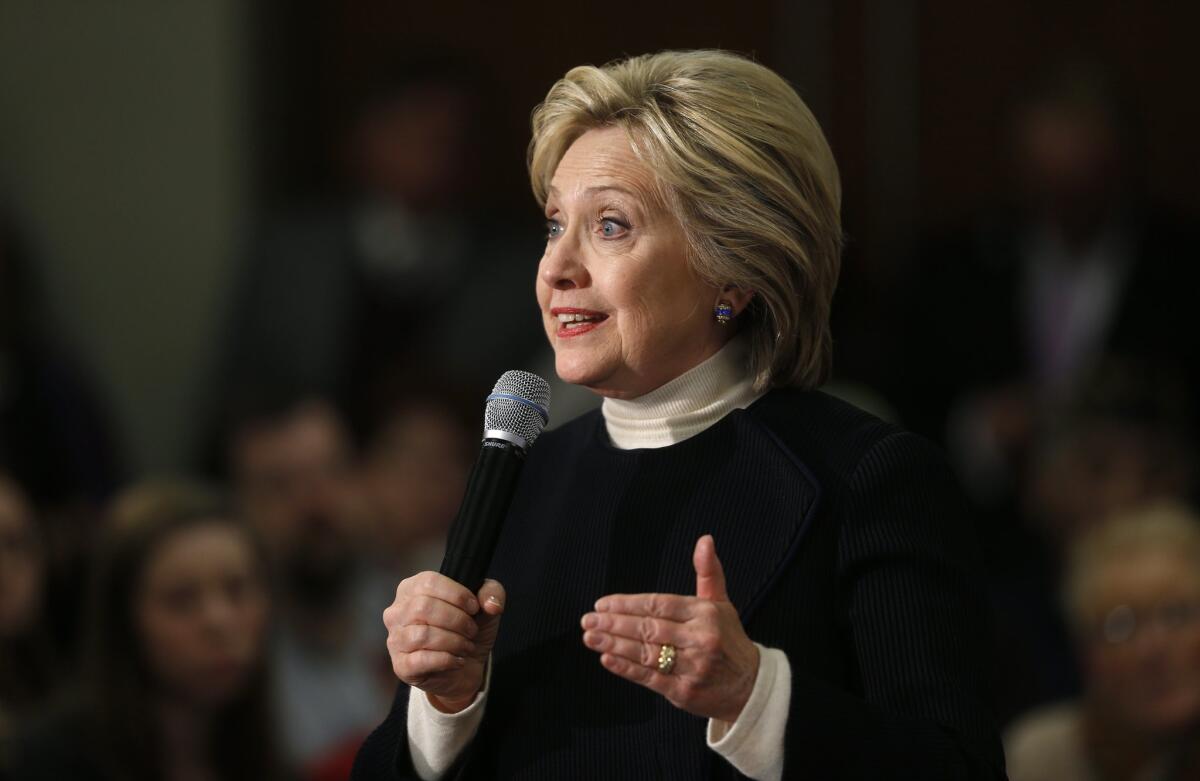Column: Yes, millennials, Hillary Clinton is a feminist

Democratic presidential candidate Hillary Clinton speaks during a town hall at the Toledo Civic Center in Toledo, Iowa on Jan. 18.
It doesn’t take a lot to make me feel old these days, and when I hear millennials attack Hillary Clinton for not being feminist enough, I can practically feel my bone density diminishing.
I understand that today’s feminism — sometimes called “fourth wave” feminism — has different contours and concerns than earlier incarnations of the women’s movement. (For what it’s worth, as a Gen Xer I am supposedly a “third waver.” ) I understand that debates about white privilege and gender fluidity are challenging truisms about what policies and practices benefit women, and even what constitutes a woman. I also understand that current definitions of sexual consent may make it impossible for young people to overlook the womanizing legacy of someone like Bill Clinton.
All of this goes a long way toward explaining why Clinton is supposedly in trouble with the 35-and-under feminist set — a situation even campaign-trail assistance from a famous millennial such as Lena Dunham can’t seem to fix — but it still rankles me.
It’s simply wrong to dismiss [Clinton] because she doesn’t adequately hew to the orthodoxy of the latest gender theory hashtag.
In an article in the Daily Beast last fall, reporter Lizzie Crocker decided Clinton was “too outdated and mainstream” on women’s issues. She quoted a number of young women who sounded like they were choosing a student body president for their ultra-liberal liberal arts college rather than a presidential candidate for a vast country that, while rapidly changing in many corners, famously resists change in others.
One 28-year-old woman from Vermont claimed Clinton’s brand of feminism was about “uplifting and forgiving white women.”
“It’s fine for middle-class white people, but it completely ignores intersectionality,” said a 27-year-old from Boston. “Feminism that doesn’t include rights for the poor, for minorities, the non-cis is just not feminism for me.”
“Cis” is short for cisgender, in case you didn’t know, and it refers to people who are not transgender. “Intersectionality” refers to the idea that oppression or social inequality operates within a framework of overlapping identities. (That’s a simplified explanation; if you want to know more, Google it and prepare to get dizzy.)
To feminists, “intersectionality” is shorthand for the idea that women from minority groups — women of color, women with disabilities, transgender women and so on — have been omitted from the record by affluent white women. In other words, glamorous, telegenic Gloria Steinem may be a household name, but important black feminists such as, say, Combahee River Collective founders Barbara and Beverly Smith remain unjustly overlooked.
It’s absolutely right to demand change on that front. And it makes sense that many in the liberal base, especially younger voters, might be disenchanted with Clinton for any number of reasons other than her feminism: her seeming reluctance to speak straightforwardly about race, her coziness with Wall Street, her hawkish foreign policies. A recent USA Today/Rock the Vote poll found that Bernie Sanders went into Sunday’s debate with a 19-percentage-point advantage among female Democrats and independent women ages 18 to 34.
The thing is, Clinton’s record on women’s rights is about as solid as it gets. As a senator she pushed for access to emergency contraception and sponsored equal-pay bills. As secretary of State she constantly kept global women’s issues in the forefront. As first lady — well, she redefined the role forever.
Although Clinton is a complicated, controversial political figure, and her policies and positions on women issues surely aren’t immune from criticism, it’s simply wrong to dismiss her because she doesn’t adequately hew to the orthodoxy of the latest gender theory hashtag.
The world Clinton has been navigating these many decades was, and remains, fraught with political and social realities that required compromise and, most of all, patience. And while some of that compromise might strike young people as a marker of a lack of integrity, the truth is that in politics — and life in general — compromise is often what moves you forward.
That can be a tough concept for idealistic 18- to 34-year-olds to accept. And OK, maybe they deserve a break — we were all idealistic once. But, in turn, shouldn’t fourth wave feminists cut second wavers such as Clinton a bit of a break too? As a third waver, all this reconsideration is giving me whiplash. And my joints aren’t as supple as they used to be.
Twitter: @meghan_daum
Follow the Opinion section on Twitter @latimesopinion and Facebook
More to Read
A cure for the common opinion
Get thought-provoking perspectives with our weekly newsletter.
You may occasionally receive promotional content from the Los Angeles Times.











